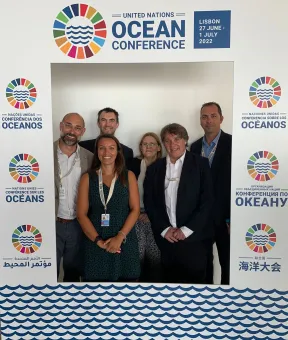
During the week 27 June to 1 July, representatives from the National Oceanography Centre (NOC), UK participated in the UN Ocean Conference in Lisbon, Portugal.
The Conference focus was on SDG14 (Life Below Water) to Conserve and Sustainably use the Ocean, Sea and Marine Resources for Sustainable Development. The Conference brought together a global community of marine researchers, decision makers and funders with a desire to work together to reverse the decline in ocean health such that the ocean will be protected and preserved for future generations and continue to provide mitigating measures against climate change.
The NOC partnered with research organisations, UN agencies and industry partners in delivering side events resulting in NOC experts participating on a number of panels, including a Scripps and GEOMAR co-sponsored event on Ocean Observing for Ocean Sustainability, an ISA led event on Advancing women empowerment and leadership in marine scientific research to support inclusive sustainable ocean governance, a World Ocean Council event on The Business of Ocean/Blue Carbon Removal: Building the Supply, Demand, Marketplace, and Monitoring for Ocean Carbon Sequestration and an iAtlantic stakeholder dialogue.
In parallel, the NOC promoted the importance of strengthening sustainable ocean-based economies, in particular for Small Island Developing States and Least Developed Countries; managing, protecting, conserving and restoring marine and coastal ecosystems; increasing scientific knowledge and developing research capacity and transfer of marine technology; and enhancing the conservation and sustainable use of oceans and their resources by implementing international law, as reflected in the United Nations Convention on the Law of the Sea. NOC Chief Executive, Professor Ed Hill CBE, also addressed the Plenary of the Conference where he promoted science-based innovative solutions as the mechanism to deliver truly global ocean action concerning the interconnected issues of climate and biodiversity and developing a sustainable knowledge-based ocean economy, working globally, united in a common endeavour and informed by the best science.
Prof Hill further commented: “The theme of this UN Ocean Conference, postponed from 2020, was ‘Scaling up Ocean Action Based on Science and Innovation for the Implementation of Sustainable Development Goal 14: Stocktaking, Partnerships and Solutions’. It is heartening to see science so prominent in gathering political momentum focused on ocean actions in the context of the convergence of the triple challenges of climate change, biodiversity loss and pollution, combined with the need for sustainable development of the ‘blue economy’. One of the important aspects of meetings like the UN Ocean Conference is they help keep focus and build political momentum and enable consistent narratives to emerge and this is why scientific engagement in them is so important to keep them informed and engaged with the ongoing need for research and evidence.”
The UN Ocean Conference built on the momentum of a number of other recent events, including UNFCCC COP26 where an Ocean Dialogue was established, reflecting the important role the ocean plays in mitigating the effects of climate change and the One Ocean Summit where States and other stakeholders committed to protecting and restoring marine ecosystems, combat IUU fishing and plastic pollution and strengthen international governance of the ocean. Evidence of this momentum was reflected in numerous commitments of new initiatives to work together, including through capacity development to protect the global marine environment. Financial support from the UK Government included use of the £500 million Blue Planet fund to enable Ocean-Country Partnerships, Sustainable Blue Economies, Coastal Restoration and Marine Protection. However it wasn’t only Member States that stepped up to the plate. With a $1 billion commitment by Philanthropic organisations to support ocean conservation and the creation, expansion, and management of marine protected areas the Conference demonstrated how the world is waking up to recognise the important role the ocean plays in sustaining human habitation on the planet Earth.
Visit our Ocean Decade hub to find out more on the Ocean Decade Actions and initiatives we're working on to support SDG14.